★★★★
“Admiring and respectful celebrations of gun-packing women as kick-butt heroines, for readers of both genders who appreciate heroines of this type.”
 The rise of self-publishing has provided an opportunity for authors to distribute their product directly to the public – it’s no longer necessary to have a contract or even a publishing house. This is, frankly, a double-edged sword: just because you can write a book, doesn’t mean you should write a book. But it also offers a better chance to reach the public for niche publications like this, a short-story collection which falls squarely into our wheelhouse, featuring a wide range of action heroines [and at least one action villainess]. Some of the ten titles might help to give you a fairly good idea of what to expect: Biker Angel; Cops and Robbers; Sisters, Dark and Light.
The rise of self-publishing has provided an opportunity for authors to distribute their product directly to the public – it’s no longer necessary to have a contract or even a publishing house. This is, frankly, a double-edged sword: just because you can write a book, doesn’t mean you should write a book. But it also offers a better chance to reach the public for niche publications like this, a short-story collection which falls squarely into our wheelhouse, featuring a wide range of action heroines [and at least one action villainess]. Some of the ten titles might help to give you a fairly good idea of what to expect: Biker Angel; Cops and Robbers; Sisters, Dark and Light.
It has a certain throwback ambiance, feeling at times like you’re reading a collection from the sixties than a modern publication. That’s not a criticism, just an observation, and might be partly because the sexual angles present in some stories are far more hinted at than explicit, and partly because there a square-jawed and certain morality present, largely without shades of grey. Brown has a nicely cinematic tone to his writing – it’s very easy to visualize proceedings in my mind’s eye as they unfolded, and the three entries mentioned above would all have potential as movies. My favorite was probably Sisters, Dark and Light, which pits an FBI agent against a kidnapper whose sadistic streak is frankly disturbing. I also enjoyed the two Capta and the Cop stories, set in the same universe, yet heading in opposite directions.
Perhaps my main criticism is a couple of the stories feel in need of expansion, almost like they were trailers more than features, albeit for movies that I’d still want to say. I did notice a few typos, though any regular readers here will know I’m hardly anyone to complain, and the packaging is too bland – it’s the kind of collection that is crying out for a pulp-styled illustration on the front. Otherwise, it certainly comes recommended to action heroine fans. There’s plenty of variety in scenarios, and even the least of the tales is still fun to read. I think the overall attitude of the stories is what makes them work: it’s the author who described them with the quote in the ‘brief’ section of the header. Having read the book, I’d say it’s perhaps a little po-faced (they’re more entertaining than that makes them sound!), but it’s not far from the mark. If you enjoy this site, I think you’ll get a kick out of these tales.
Update: August 2010. Thad tells me there is now a new edition, which has all the typos corrected, as well as having page numbers, a table of contents, and even has the messed-up line breaks in the preface fixed. He adds, “I wasn’t able to do a cover with a pulp-style illustration that you said it cried out for; I’d wanted to import Rich’s biker picture that inspired “Biker Angel,” but Lulu’s software just wouldn’t cooperate! I did install a different cover image, a smoking revolver on a russet -sort of dried-blood-colored-background, which I thought was pretty cool.”
Update: December 2013. After one regular publishing deal fell through, the last I heard from Thad was that the collection “has now been accepted for publication by Pro Se Productions” and “should be available for purchase in both paperback and e-book formats sometime around mid-2013.” Checking their site, no sign at this point.
Update: April 2014. A little delayed, but we’re delighted to announce the book is now available through Amazon. You may recognize the quote. :)
Update: November 2014. It’s now available in e-form on Kindle, for only $2.99!
[The opening of one of the stories, Cops and Robbers, can be found here, as a taster for the book.





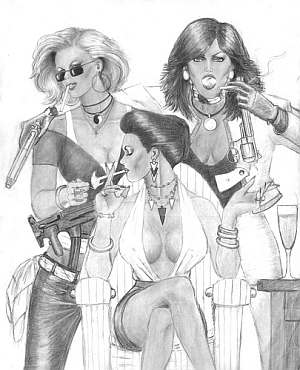
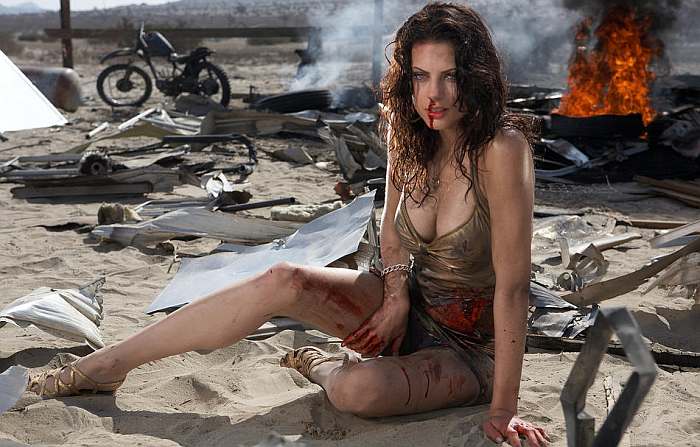 ★★★★
★★★★ Chris has a certain firmness of opinion. When she has made up her mind about something, it’s pretty hard to get her to change it. She will purse her lips, fold her arms and stick to her guns. You could argue whether this strong will is a character quality or a flaw, but it certainly led to her early exit from Bitch Slap. Here’s an approximate timeline of the comments from the seat on the couch next to me:
Chris has a certain firmness of opinion. When she has made up her mind about something, it’s pretty hard to get her to change it. She will purse her lips, fold her arms and stick to her guns. You could argue whether this strong will is a character quality or a flaw, but it certainly led to her early exit from Bitch Slap. Here’s an approximate timeline of the comments from the seat on the couch next to me:
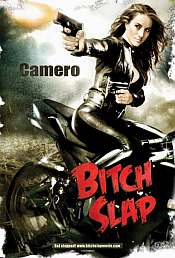
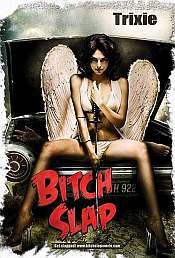
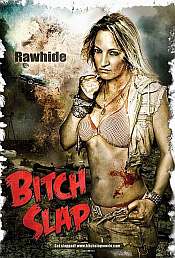
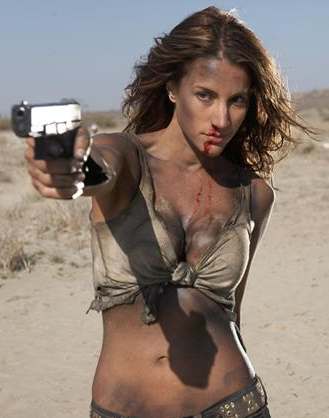 The main weak link is the leads, who don’t have the chops – physical or acting – to pull this off. I to wonder whether it might have been a good deal better if stunt co-ordinator Zoe Bell, Lucy Lawless and Renee O’Connor had been the stars of the film, rather than merely cameos. They have all previously shown the necessary combination of martial ability and screen presence necessary for the parts here. Not that the actresses here are “bad”: however, when you’re spitting out Satana-esque lines like, “Ram this in your clambake, bitch cake!” you’d
The main weak link is the leads, who don’t have the chops – physical or acting – to pull this off. I to wonder whether it might have been a good deal better if stunt co-ordinator Zoe Bell, Lucy Lawless and Renee O’Connor had been the stars of the film, rather than merely cameos. They have all previously shown the necessary combination of martial ability and screen presence necessary for the parts here. Not that the actresses here are “bad”: however, when you’re spitting out Satana-esque lines like, “Ram this in your clambake, bitch cake!” you’d 

















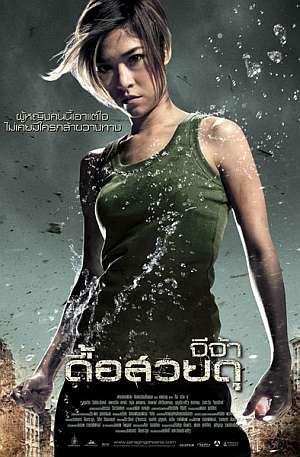 If you’ve seen Chocolate – starring the same lead actress, though confusingly billed under a different name here – you’ll know what to expect, and the film delivers much of the same. Which would be stunning, brutal fight scenes combined with moments of mind-numbing tedium. The plan for Yanin’s career seems to be to contrive methods by which she can avoid acting: last time it was autism; here, it’s a drunken style of kung-fu which helps mitigate a voice that might charitably be compared to broken nails on glass. She plays former rock-star(!) Deu, who is on the edge of being kidnapped, when she’s rescued by Sanim (Tang). He and his fellow masters of alcohol-fu have all lost ladies in their life to the kidnappers – who, it turns out, are doing this because… No. You wouldn’t believe me even if I told you – and are trying to locate their lair. Deu joins the team, and agrees to act as bait, to see if the kidnappers will go after her again.
If you’ve seen Chocolate – starring the same lead actress, though confusingly billed under a different name here – you’ll know what to expect, and the film delivers much of the same. Which would be stunning, brutal fight scenes combined with moments of mind-numbing tedium. The plan for Yanin’s career seems to be to contrive methods by which she can avoid acting: last time it was autism; here, it’s a drunken style of kung-fu which helps mitigate a voice that might charitably be compared to broken nails on glass. She plays former rock-star(!) Deu, who is on the edge of being kidnapped, when she’s rescued by Sanim (Tang). He and his fellow masters of alcohol-fu have all lost ladies in their life to the kidnappers – who, it turns out, are doing this because… No. You wouldn’t believe me even if I told you – and are trying to locate their lair. Deu joins the team, and agrees to act as bait, to see if the kidnappers will go after her again. ★★★★
★★★★ The second series of TLC’s “mommy cops” reality series struck close to home, centered as it was on Phoenix. It didn’t come as much surprise as our local sheriff, Joe Arpaio, is infamous locally as a media whore, who wastes no opportunity for self-promotion, and is a sharply-divisive figure locally, adored and loathed by about equal parts of the population. We wondered how long it would take before Joe slimed his way onto the screen: six minutes into the first episode, we had our answer. Fortunately, this was more of a blip, and our fears of an Arpaio-centered show proved largely unfounded [see the execrable Smile… You’re Under Arrest for how bad this could have been].
The second series of TLC’s “mommy cops” reality series struck close to home, centered as it was on Phoenix. It didn’t come as much surprise as our local sheriff, Joe Arpaio, is infamous locally as a media whore, who wastes no opportunity for self-promotion, and is a sharply-divisive figure locally, adored and loathed by about equal parts of the population. We wondered how long it would take before Joe slimed his way onto the screen: six minutes into the first episode, we had our answer. Fortunately, this was more of a blip, and our fears of an Arpaio-centered show proved largely unfounded [see the execrable Smile… You’re Under Arrest for how bad this could have been].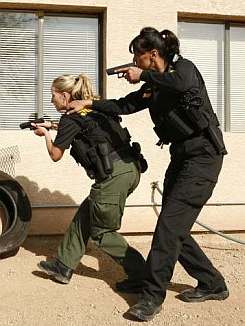 As notable as what is shown, is what was
As notable as what is shown, is what was 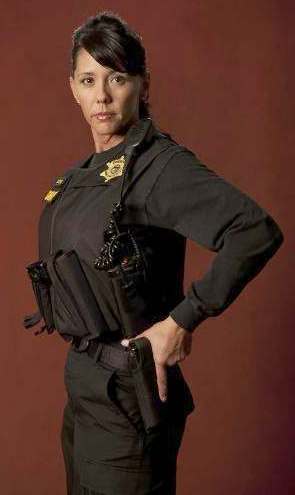 Finally, there’s Detective Deborah Moyer (right), who is completely marvellous, and the main reason to watch the show. A 19-year veteran, we’d be entirely happy if the show was 100% about her. While the other women occasionally seem very scripted when they are talking to the camera, that isn’t the case with Moyer: there’s a definite sense that what you see is what you get with her. While her policing style may not be “by the book” – in one episode, she basically arrests a teenage girl for failing to hug her father – her reactions are entirely natural and certainly had us nodding in approval more often than not. She just comes across as being very normal: when she encounters a young perpetrator, she tends to think about her own kids of the same age.
Finally, there’s Detective Deborah Moyer (right), who is completely marvellous, and the main reason to watch the show. A 19-year veteran, we’d be entirely happy if the show was 100% about her. While the other women occasionally seem very scripted when they are talking to the camera, that isn’t the case with Moyer: there’s a definite sense that what you see is what you get with her. While her policing style may not be “by the book” – in one episode, she basically arrests a teenage girl for failing to hug her father – her reactions are entirely natural and certainly had us nodding in approval more often than not. She just comes across as being very normal: when she encounters a young perpetrator, she tends to think about her own kids of the same age.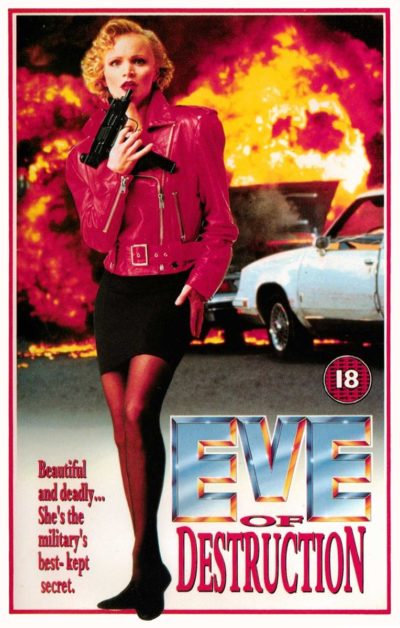 While undeniably a product of its time – which would be 1991 – this has stood the test of time very well, and remains a solid piece of action SF. Eve Simmons (Soutendijk) is a researcher working for the US government on creating life-like robots for surveillance missions, and her creation, Eve VIII, not only looks like her, but has her memories and psychology too. When on a test run in San Francisco, Eve VIII is caught up in a bank robbery and a bullet sends her off the grid, and on her own mission. Jim McQuade (Hines), something like a proto-Jack Bauer, is brought in to track down the lost little robot, who has all of her creator’s complexes, but none of the social restraints, leading to a fondness for automatic weapons, which she uses with abandon as she works out her psychiatric issues [cheaper than counselling, and a good deal more fun]. Oh, and Eve VIII also has a nasty little surprise package tucked away inside. It’s up to McQuade and Simmons to stop the killing machine before things
While undeniably a product of its time – which would be 1991 – this has stood the test of time very well, and remains a solid piece of action SF. Eve Simmons (Soutendijk) is a researcher working for the US government on creating life-like robots for surveillance missions, and her creation, Eve VIII, not only looks like her, but has her memories and psychology too. When on a test run in San Francisco, Eve VIII is caught up in a bank robbery and a bullet sends her off the grid, and on her own mission. Jim McQuade (Hines), something like a proto-Jack Bauer, is brought in to track down the lost little robot, who has all of her creator’s complexes, but none of the social restraints, leading to a fondness for automatic weapons, which she uses with abandon as she works out her psychiatric issues [cheaper than counselling, and a good deal more fun]. Oh, and Eve VIII also has a nasty little surprise package tucked away inside. It’s up to McQuade and Simmons to stop the killing machine before things 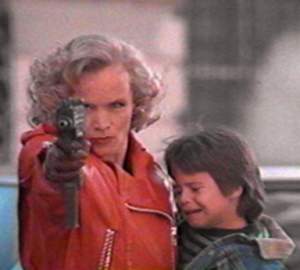 But as a straightforward B-movie, it works nicely, with Hines having a nicely sardonic wit: “A spinach lasagne, in a light tomato and basil sauce,” is the reply, when Simmons asks dubiously what is McQuade’s “specialty” as a government agent. I’m still trying to work out if the film is feminist or chauvinist: you could read it either way, with the ‘liberated’ (if robotic) woman a free spirit, though the ending firmly puts Even back in her place, to say the least. She also emasculates one man, somewhat familiar territory for Soutendijk, who previously wielded a scissors to leg-crossing effect in The Fourth Man. Gibbins, meanwhile, died in the 1993 Hollywood fires, while trying to rescue a cat. Guess there’s never an unstoppable robot around when you really need one.
But as a straightforward B-movie, it works nicely, with Hines having a nicely sardonic wit: “A spinach lasagne, in a light tomato and basil sauce,” is the reply, when Simmons asks dubiously what is McQuade’s “specialty” as a government agent. I’m still trying to work out if the film is feminist or chauvinist: you could read it either way, with the ‘liberated’ (if robotic) woman a free spirit, though the ending firmly puts Even back in her place, to say the least. She also emasculates one man, somewhat familiar territory for Soutendijk, who previously wielded a scissors to leg-crossing effect in The Fourth Man. Gibbins, meanwhile, died in the 1993 Hollywood fires, while trying to rescue a cat. Guess there’s never an unstoppable robot around when you really need one.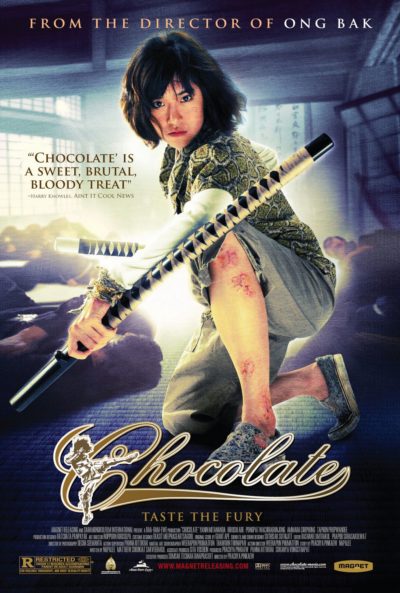 We couldn’t wait for this one to get an official American release, so off to Ebay we went for a copy of uncertain origin. This was something of a double-edged sword. It means we get to tell you that this is, hands down,
We couldn’t wait for this one to get an official American release, so off to Ebay we went for a copy of uncertain origin. This was something of a double-edged sword. It means we get to tell you that this is, hands down, 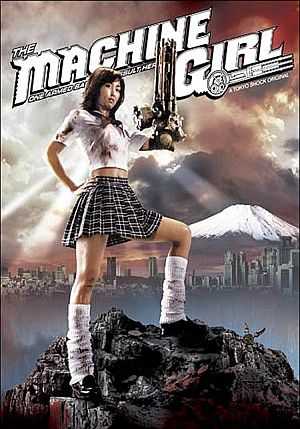
 If you enjoyed Planet Terror, you’ll likely get a kick out of this, which also combines elements of The Evil Dead, Kill Bill and Tetsuo the Iron Man into what has got to be the bloodiest movie of 2008. The life of Ami (Yashiro) is turned upside down when her brother and his friend are killed by school bullies under the control of a local gangster’s son (Nishihara). Ami sets out for revenge on all those responsible for the killings. But the Yakuza don’t take kindly to this and Ami finds herself with a count of functioning limbs that ends at three. Does that stop her? Of course not. Teaming up with the late friend’s mother Miki (Asami), whose husband happens to be an ace mechanic, Ami gets fitted with a machine-gun and the pair of vengeful vixens head off for a return match.
If you enjoyed Planet Terror, you’ll likely get a kick out of this, which also combines elements of The Evil Dead, Kill Bill and Tetsuo the Iron Man into what has got to be the bloodiest movie of 2008. The life of Ami (Yashiro) is turned upside down when her brother and his friend are killed by school bullies under the control of a local gangster’s son (Nishihara). Ami sets out for revenge on all those responsible for the killings. But the Yakuza don’t take kindly to this and Ami finds herself with a count of functioning limbs that ends at three. Does that stop her? Of course not. Teaming up with the late friend’s mother Miki (Asami), whose husband happens to be an ace mechanic, Ami gets fitted with a machine-gun and the pair of vengeful vixens head off for a return match.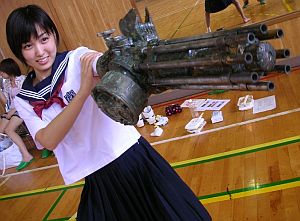 Yashiro’s background is in…well, what could politely be described as ‘bikini videos’, not action movies, but her performance here is respectable enough. Probably more impressive are Asami, and Honoka, who plays the wife of the Yakuza boss. They both, too, come from the adult industry, possessing an impressive feral intensity which reminded me of Brigitte Lahaie in Fascination, and is entirely in keeping with the grindhouse feel of the entire enterprise. You could argue that the trailer contains everything you need to see, in a more concentrated form, and I wouldn’t argue with that, or if you said this was no more than a porn variant, where nothing matters except the money shots of body fluids getting sprayed everywhere. Still, we had a blast, and the film fully lives up to the sleeve description, delivering the “One-Armed Ballistic Assault Heroine” it promises, in spades.
Yashiro’s background is in…well, what could politely be described as ‘bikini videos’, not action movies, but her performance here is respectable enough. Probably more impressive are Asami, and Honoka, who plays the wife of the Yakuza boss. They both, too, come from the adult industry, possessing an impressive feral intensity which reminded me of Brigitte Lahaie in Fascination, and is entirely in keeping with the grindhouse feel of the entire enterprise. You could argue that the trailer contains everything you need to see, in a more concentrated form, and I wouldn’t argue with that, or if you said this was no more than a porn variant, where nothing matters except the money shots of body fluids getting sprayed everywhere. Still, we had a blast, and the film fully lives up to the sleeve description, delivering the “One-Armed Ballistic Assault Heroine” it promises, in spades.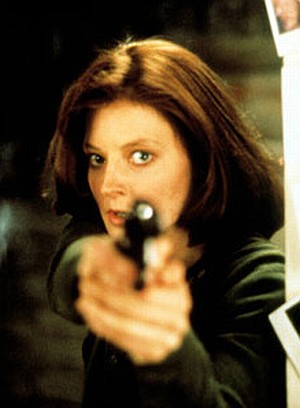
 Let’s start off by giving us a heroine who is dying, thanks to an inoperable brain tumour. Way to bring me down, Juncture: what do you think this is? DamesWithDiseases.com? The Hallmark channel is tha…oh, hang on. She’s following a child-porn purchaser back to his house, and guns him down? Hmmm. This is clearly not your everyday Illness of the Week flick. For Anna Carter (Blackport) has decided to go out with a bang: several of them, in fact. Realising she only has a short time to live, she decides to extend her day-job as the co-ordinator for a charitable foundation, and correct the failings of a justice system: neglectful mothers, drunk drivers, selfish CEOs, they’re all likely to meet impeccably-dressed vengeance.
Let’s start off by giving us a heroine who is dying, thanks to an inoperable brain tumour. Way to bring me down, Juncture: what do you think this is? DamesWithDiseases.com? The Hallmark channel is tha…oh, hang on. She’s following a child-porn purchaser back to his house, and guns him down? Hmmm. This is clearly not your everyday Illness of the Week flick. For Anna Carter (Blackport) has decided to go out with a bang: several of them, in fact. Realising she only has a short time to live, she decides to extend her day-job as the co-ordinator for a charitable foundation, and correct the failings of a justice system: neglectful mothers, drunk drivers, selfish CEOs, they’re all likely to meet impeccably-dressed vengeance. Still, there’s a great deal to admire here, with every penny being squeezed out of the budget. Particular kudos to cinematographer Richard Lerner and composer Neal Acree, whose efforts enhance proceedings significantly – the results look to be the product of a significantly-higher budget, than the rumoured million dollars. It leaves you questioning what you would do in the same situation: follow Queen Latifah off on a Last Holiday, or head for the dark side, as Anna does here, with a mission for what you perceive as the ‘greater good’? Certainly more thought-provoking than usual, it’s intended as the first part on a trilogy, though stands fairly well on its own, I would be very interested to see how things proceed from here, as Anna heads towards closure, both personal and medical.
Still, there’s a great deal to admire here, with every penny being squeezed out of the budget. Particular kudos to cinematographer Richard Lerner and composer Neal Acree, whose efforts enhance proceedings significantly – the results look to be the product of a significantly-higher budget, than the rumoured million dollars. It leaves you questioning what you would do in the same situation: follow Queen Latifah off on a Last Holiday, or head for the dark side, as Anna does here, with a mission for what you perceive as the ‘greater good’? Certainly more thought-provoking than usual, it’s intended as the first part on a trilogy, though stands fairly well on its own, I would be very interested to see how things proceed from here, as Anna heads towards closure, both personal and medical.